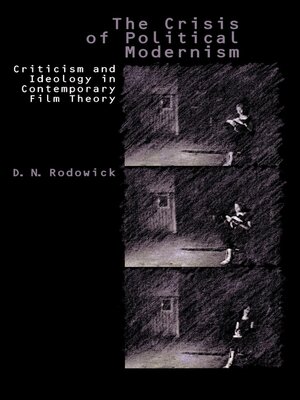The Crisis of Political Modernism
ebook ∣ Criticism and Ideology in Contemporary Film Criticism
By D. N. Rodowick

Sign up to save your library
With an OverDrive account, you can save your favorite libraries for at-a-glance information about availability. Find out more about OverDrive accounts.
Find this title in Libby, the library reading app by OverDrive.



Search for a digital library with this title
Title found at these libraries:
| Library Name | Distance |
|---|---|
| Loading... |
D.N. Rodowick offers a critical analysis of the development of film theory since 1968. He shows how debates concerning the literary principles of modernism—semiotics, structuralism, psychoanalysis, Marxism, and feminism—have transformed our understanding of cinematic meaning. Rodowick explores the literary paradigms established in France during the late 1960s and traces their influence on the work of diverse filmmaker/theorists including Jean-Luc Godard, Peter Gidal, Laura Mulvey, and Peter Wollen. By exploring the "new French feminisms" of Irigaray and Kristeva, he investigates the relation of political modernism to psychoanalysis and theories of sexual difference. In a new introduction written especially for this edition, Rodowick considers the continuing legacy of this theoretical tradition in relation to the emergence of cultural studies approaches to film.
D.N. Rodowick offers a critical analysis of the development of film theory since 1968. He shows how debates concerning the literary principles of modernism—semiotics, structuralism, psychoanalysis, Marxism, and feminism—have transformed our understanding
D.N. Rodowick offers a critical analysis of the development of film theory since 1968. He shows how debates concerning the literary principles of modernism—semiotics, structuralism, psychoanalysis, Marxism, and feminism—have transformed our understanding







